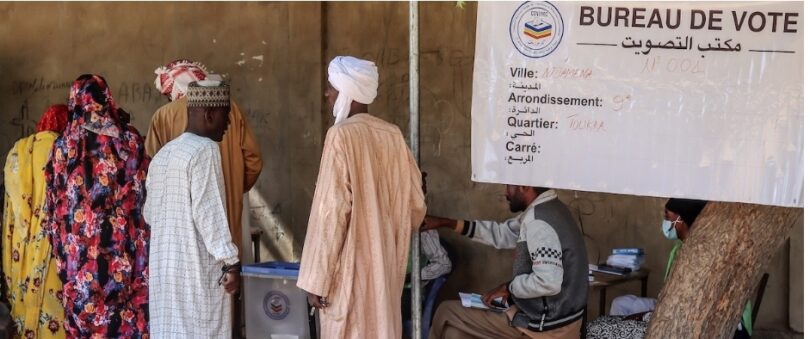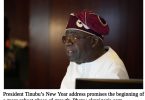Chad’s political landscape has been marked by tumultuous events over the past three years, with the death of former President Idriss Deby Itno and the army’s takeover. However, the announcement of the 2024 presidential elections has instilled new hope among the population.
An Unexpected Regime Change On April 20, 2021, Chad experienced a turning point when the army took control of the country following the death of former President Déby Itno, who succumbed to his injuries during clashes with the rebel group DONE. This transition saw the suspension of the Constitution and the dissolution of government institutions, paving the way for the establishment of a Transitional Military Council led by Mahamat Idriss Deby, the son of the late president.
The Road to Elections After repeated delays and broken promises, Chad’s electoral agency has finally set the dates for presidential elections, affirming its commitment to restoring democracy. The elections will take place in two rounds, with provisional results expected by July 7 at the latest.
Key Dates The leaders had initially promised military elections 18 months after taking power, but postponed the transition until October 10, 2024. The first round of elections is scheduled for May 6, followed by the second round on June 22.

Analysis of the Elections Analysts announce that these elections could only be a formality to confirm Mahamat Idriss Déby as civilian president. His rise to power after the death of his father was cited as having violated the Constitution. In addition, his candidacy meets the commitments made to the African Union.
The 2024 presidential elections are a pivotal moment for Chad, offering a chance for democratic progress. However, the legitimacy of the electoral process and the future of democracy in the country remain uncertain.
Chad: A Crossroads of Challenges and Hopes in Central Africa
Chad, a landlocked nation in Central Africa, is home to a population of 18 million people. Despite its vast natural resources, it is among the least developed countries on the globe. Nevertheless, it stands out for its generosity, offering refuge to hundreds of thousands of refugees fleeing conflicts in neighboring Sudan.
An Ally Against Terrorism Chad has built a reputation as a reliable partner in the fight against terrorism, a commitment which cost the life of the former president during clashes. This position has earned him the respect of Western nations, especially at a time when other countries are reevaluating their alliances. Currently, Chad is hosting French troops relocated from Niger and some American soldiers.

A Military Transition American sources indicate that the commander of the Chadian air force has asked American forces to suspend operations at an air base in Ndjamena. As a result, some troops are temporarily withdrawing, pending the outcome of the upcoming elections.
The Candidates in the Running Despite his status as interim leader and his promise not to run, Mahamat Idriss Déby, nicknamed Kaka, emerges as the favorite of the election. A high-ranking soldier, trained in Chad and France, he is also known for his large family.
Success Masra, the current Prime Minister and former exile, is also a candidate. Returning from exile and having made an agreement with Déby, he has led the government since January but has lost his popularity, accused of compromising for power.
Controversies and Exclusions Eight other candidates were allowed to compete, but two opposition figures, Nassour Ibrahim Neguy Koursami and Rakhis Ahmat Saleh, were disqualified for alleged “irregularities.” Analysts suggest these decisions are politically motivated.
Yaya Dillo, a leading opposition figure, was killed by security forces in February 2024, an act described as assassination by his party. The preceding democratic demonstrations also caused casualties.
Electoral Calendar Elections are scheduled for May 6, with a possible runoff on June 22. The results should be announced in the following weeks.
Who’s the favourite to win?
Chad has never experienced a free and fair election, and the upcoming one does not appear to be any different. Several experts suggest that Mr Deby cannot be removed from power unless a coup d’état occurs.
In an interview with the New York Times, Lynda Iroulo, an expert on international relations at Georgetown University in Qatar, warns against assuming that winning the vote means popularity for Chad’s candidate. She explains that even though there are no regular elections in Mali, Burkina Faso and Niger like those held by Chad, their juntas still have more support from the people.
“Cutting off the French influence in their countries,” she said, is why “most of them have received some degree of popular support.”
While thousands of people have shown their support for the juntas in other countries, Chad is an exception. However, Mr Déby has taken measures to prevent any candidate with significant backing from contesting against him and potentially winning. The exclusion of numerous opponents is strongly criticized by the opposition, which accuses the constitutional council described as “unequal and subservient to the junta”. of having validated only candidates actually supporting General Mahamat Déby, and whose “Pretext candidacies” would only aim to provide an illusion of democracy. A large part of the opposition united within the Wakit Tamma platform therefore calls for a boycott of the vote, described as a “masquerade.
According to Ndjamena student and Human Rights advocate Samira Abdelkhader interviewed by our media, she has witnessed no changes throughout her entire life (born in 1990), and believes that things will remain the same after the 2024 presidential elections.
Written by Olivier Noudjalbaye Dedingar, USA/ UN Correspondent








